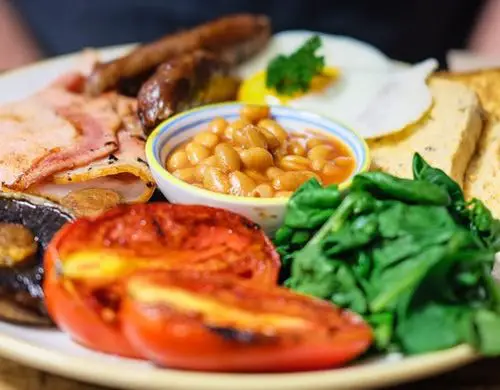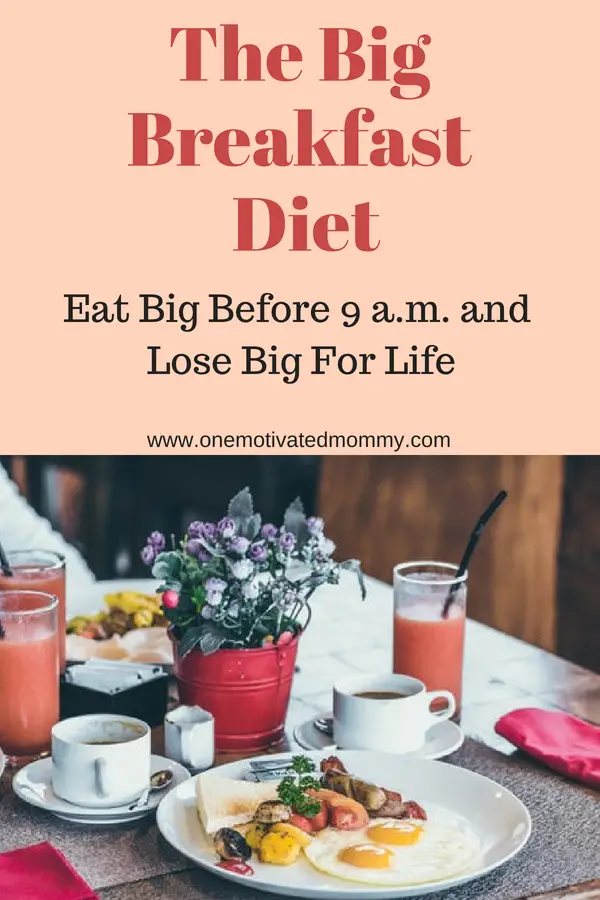There are so many weight loss and nutrition plans out there today – Paleo, Ketogenic, Intermittent Fasting, OMAD or One Meal a Day, If It Fits Your Macros, Mediterranean, Dukan, South Beach… the list is endless. But have you ever come across The Big Breakfast Diet?
I’m sure you’ve heard that breakfast is the ‘most important meal of the day’, or the advice attributed to Adelle Davis, the American nutritionist, to ‘eat breakfast like a king, lunch like a prince and dinner like a pauper’.
Well according to one doctor, there are many benefits to following this advice.

The Big Breakfast Diet, Eat Big Before 9 AM and Lose Big For Life, was written by Dr. Daniela Jakubowicz, a specialist in endocrinology and metabolic diseases. She has published numerous studies on the effect of insulin resistance on obesity, polycystic ovarian syndrome (PCOS), infertility, diabetes and metabolic syndrome.
Dr. Jakubowicz noticed while treating patients with certain metabolic conditions that when they ate certain types of foods at specific times of the day that “they lost weight more quickly and easily”.
This diet is essentially based on eating optimally in sync with the circadian and hormonal rhythms that the body goes through on a daily basis.
“Natural rhythms, called circadian rhythms influence metabolism, body weight, hunger and cravings. These rhythms dictate the body’s hormonal ‘environment’. Some hormones rule the body during the daylight hours, whereas others rule the night.” ~ The Big Breakfast Diet.
Dr. Jakubowicz explains the ‘day shift’ and ‘night shift’ hormones and their role in fat storage as well as fat burning and muscle growth and preservation.
For example, she shows you how to maximize Human Growth Hormone (HGH) which is a hormone that helps the body use fat reserves as fuel, thereby burning fat that leads to weight loss. This hormone peaks between midnight and 1 a.m. so she guides you, through the diet, to ensure that you are in an optimal state to allow the body to burn fat when HGH is at its highest levels.
According to the book, if you use the guidelines laid out for The Big Breakfast Diet,
“…you can expect to:
• Rev up your metabolism
• Burn more calories by day and more fat at night
• Enjoy your favourite foods as you lose weight
• Satisfy your hunger all day
• Eliminate cravings for sweets and starches
• Feel alert and refreshed when you awaken in the morning, rather than sluggish and foggy
• Enjoy energy to burn, and
• Reduce your risk for serious health conditions such as type 2 diabetes and heart disease.”
The Study
In 2007 an eight-month study was conducted by Dr. Jakubowicz and her team on 94 women with metabolic syndrome.
The women were divided into two groups. One group followed the Big Breakfast plan (BB), eating a high protein, high-calorie breakfast, while the other followed a Low Carbohydrate plan (LCH).
“The Big Breakfast group consumed more calories each day than the Low Carb group, but their daily intake was front-loaded.”
In other words, the women in the BB group ate most of their allotted daily calories for breakfast.
The Results
Both groups lost a significant amount of weight in the first 16 weeks of the study but the BB group kept it off. Not only that, in the 16 weeks that followed, the BB group continued to lose weight but the LCH group regained it.
The Diet
Most people tend to skip breakfast, grab lunch on the go and then come home to have the biggest meal of the day which is dinner.
According to Dr. Jakubowicz, this is not how it should be done based on the body’s natural rhythm.
- The breakfast that is recommended is high in protein, has a satisfying amount of carbohydrates and fats and even makes allowances for something sweet…cake for breakfast?
- Breakfast can be anywhere in the range of 610 to 850 calories (and more in some cases)!
- Lunch and dinner are then very low carbohydrate/lower calorie allowing for a certain amount of protein, low-glycemic fruits and vegetables.
- You are given guidance on portion sizes and servings of protein, fat and carbohydrates to keep hunger at bay and boost your metabolism throughout the day.
- There is also a vegetarian option of the plan.
One of the main benefits of the diet is that it keeps you feeling satisfied for hours, so much so, that you may not want to eat lunch at lunchtime, but the book advises that you still try to eat lunch and skip dinner if you are not hungry (good for intermittent fasting fans?)
Also, you can basically still eat your favourite foods, once you follow the meal formulas as laid out in the book. So, chocolate, pizza, burgers, Trini doubles, bread and pastries etc., can still be a part of your life.
There is a list of ‘free foods’ that you can have between meals, such as unsweetened tea or sparkling water.
She also provides her readers with a recipe for her ‘stew’ which is packed with vegetables and can be eaten should hunger pangs show up outside of meal times.
This book cites numerous studies on satiety, hunger, insulin resistance and circadian rhythm, to name a few, and gives a list of selected scientific references.
There are also testimonials in the book by some of Dr. Jakubowicz’s patients who have had success with her program.
As a bonus, you are given 30 recipes to include breakfast, lunch and dinner as well as vegetarian options, but once you are familiar with the lists and guidelines of the diet you are encouraged to create your own meals.
The “Staying Slim for Life” chapter of the book is where Dr. Jakubowicz outlines how to maintain the diet and how to get back on track after a night out, a wedding or a vacation where you may have strayed from the program.
This chapter offers advice on troubleshooting for ‘roadblocks’ you may encounter on your weight loss journey. There is even advice on how to deal with PMS cravings and ‘That Time of the Month.’
The doctor also encourages you to exercise or at least just move your body for 20 minutes a day. This in conjunction with the diet will help you to “burn calories, build muscle and improve your body’s sensitivity to insulin.”
I have found the information in this book to be quite enlightening, especially with respect to the information on changing levels of various hormones throughout the day and how this affects our metabolism. I like that it is backed by scientific studies.
My only disappointment was the mention of the use of artificial sweeteners as a sugar alternative.
Evidenced by the scientific studies, and looking at favourable Amazon reviews, it seems that some people are losing weight and keeping it off using the methods outlined by Dr. Jakubowicz in The Big Breakfast Diet.


